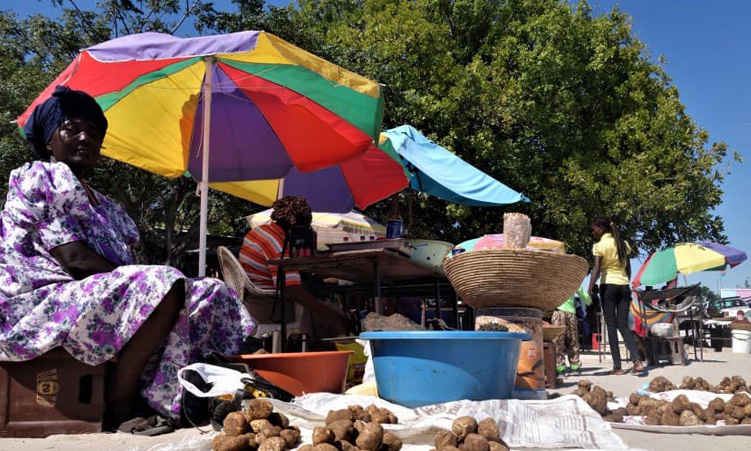IT should come as no surprise that Trade and Industry Minister Hage Geingob and European Union Ambassador Elizabeth Pape almost came to verbal blows this week.
At stake are the trade deals being organised and executed by the World Trade Organisation and the EU’s executive arm, the European Commission. Geingob, and quite correctly in our opinion, states that the international rules of the WTO and the EU are being shaped by the developed world to suit their countries’ own economic agenda.Economic partnership agreements (EPAs) are essentially bilaterals that cause more harm to regional integration in southern Africa, Geingob says.Pape hits back and says that she is surprised to hear about the accusation that the European Union is hindering regional integration in Africa.She argues that the blocs of trade such as the Southern African Development Community and Ecowas were created by African countries and not by the EU.In this, she is supported by SADC secretariat’s Tswelelopele Moremi, who also asserts that the fragmentation of Africa’s trade blocs cannot be blamed on the EU.We are of the opinion that trade and economic interests are key to power-brokering in the globe today.So, it is in our direct interest to call things by their name and not dodge the issues.Peter Draper from the SA Institute of International Affairs argues that the EPAs are being pushed further than southern Africa can go.There are political reasons behind the push, he says, because the EU treats South Africa differently in the regional set-up than the other four member states of the Southern African Customs Unions and the members of SADC.South Africa has concluded a separate agreement with the EU, yet that country remains part of the SADC group negotiating the EPAs.The text in the EPAs insists that southern African countries should be giving EU states the same trade preferences as to Brazil, for example, where farmers are not subsidised by governments as in the EU.Geingob and the Namibian Government are right to call for more discussion and serious reflection on the EPAs as they are currently written.In the first place, Namibia’s economy is miniscule compared with South Africa and it is a serious flight of fancy to believe that the envisaged WTO and EU deals will favour our small and developing enterprises.In the second place, while Namibians must acknowledge that the fragmentation of Africa’s trade blocs is hardly the outcome of the EU’s machinations, it is unacceptable that South Africa enjoys a favoured nation status that effectively undermines a collective agreement between SADC countries (of which it is a member) and the EU.Africa’s economic powerhouse needs to be brought in line with the rest of the region’s interests and must not be allowed to undermine an essential solidarity necessary for future co-operation and development between ourselves and our neighbours.The EU’s Pape is looking after the interests of her constituents in Europe.There is nothing wrong or untoward about this.The EU is negotiating as a bloc, and yet it has chosen to deal separately with countries such as South Africa and Namibia.Similarly, Geingob is, or should be, looking after the interests of Namibia and an Africa that is becoming increasingly ripe for global pickings.We are a mineral-rich continent with abundant resources to feed, house, adequately clothe.We are also able to provide the most sophisticated and cutting-edge services to our people if our products are not endlessly exported to the countries of the North.Intra-Africa trade must become our watchword and clarion call.While the world gyrates about the global meltdown triggered by the subprime crisis in the US, our economic and financial fundamentals remain sound.Namibian banks are on a good footing and there is no reason to believe that this will change presently.There is no reason for us to rush into deals whose consequences we may learn to regret.If we take our time to consider our options on the EPAs, then so be it.After all we are a sovereign state and an active economic participant in southern Africa.Geingob, and quite correctly in our opinion, states that the international rules of the WTO and the EU are being shaped by the developed world to suit their countries’ own economic agenda.Economic partnership agreements (EPAs) are essentially bilaterals that cause more harm to regional integration in southern Africa, Geingob says.Pape hits back and says that she is surprised to hear about the accusation that the European Union is hindering regional integration in Africa.She argues that the blocs of trade such as the Southern African Development Community and Ecowas were created by African countries and not by the EU.In this, she is supported by SADC secretariat’s Tswelelopele Moremi, who also asserts that the fragmentation of Africa’s trade blocs cannot be blamed on the EU.We are of the opinion that trade and economic interests are key to power-brokering in the globe today.So, it is in our direct interest to call things by their name and not dodge the issues.Peter Draper from the SA Institute of International Affairs argues that the EPAs are being pushed further than southern Africa can go.There are political reasons behind the push, he says, because the EU treats South Africa differently in the regional set-up than the other four member states of the Southern African Customs Unions and the members of SADC.South Africa has concluded a separate agreement with the EU, yet that country remains part of the SADC group negotiating the EPAs.The text in the EPAs insists that southern African countries should be giving EU states the same trade preferences as to Brazil, for example, where farmers are not subsidised by governments as in the EU.Geingob and the Namibian Government are right to call for more discussion and serious reflection on the EPAs as they are currently written.In the first place, Namibia’s economy is miniscule compared with South Africa and it is a serious flight of fancy to believe that the envisaged WTO and EU deals will favour our small and developing enterprises.In the second place, while Namibians must acknowledge that the fragmentation of Africa’s trade blocs is hardly the outcome of the EU’s machinations, it is unacceptable that South Africa enjoys a favoured nation status that effectively undermines a collective agreement between SADC countries (of which it is a member) and the EU.Africa’s economic powerhouse needs to be brought in line with the rest of the region’s interests and must not be allowed to undermine an essential solidarity necessary for future co-operation and development between ourselves and our neighbours.The EU’s Pape is looking after the interests of her constituents in Europe.There is nothing wrong or untoward about this.The EU is negotiating as a bloc, and yet it has chosen to deal separately with countries such as South Africa and Namibia.Similarly, Geingob is, or should be, looking after the interests of Namibia and an Africa that is becoming increasingly ripe for global pickings.We are a mineral-rich continent with abundant resources to feed, house, adequately clothe.We are also able to provide the most sophisticated and cutting-edge services to our people if our products are not endlessly exported to the countries of the North.Intra-Africa trade must become our watchword and clarion call.While the world gyrates about the global meltdown triggered by the subprime crisis in the US, our economic and financial fundamentals remain sound.Namibian banks are on a good footing and there is no reason to believe that this will change presently.There is no reason for us to rush into deals whose consequences we may learn to regret.If we take our time to consider our options on the EPAs, then so be it.After all we are a sovereign state and an active economic participant in southern Africa.
Stay informed with The Namibian – your source for credible journalism. Get in-depth reporting and opinions for
only N$85 a month. Invest in journalism, invest in democracy –
Subscribe Now!






